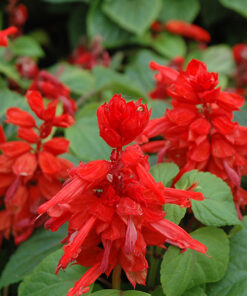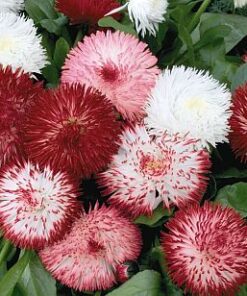Melampodium Derby seeds pack of 15-20 seeds Imported
₹70.00
Out of stock
Email when stock available
- Melampodium Uses:Plants for the border and window boxes, pot and container plants, marsh plant
- Exposure:Sun – Partial shade
- Garden height:8″ / 20 cm
- Crop time:12-14 weeks
- Sow time:February-May
- Sowing method:1-2 seeds per plug
- Germination*:7-14 days at 65-68 °F (18-20 °C). Cover seed lightly after sowing. Maintain high, but not saturated soil moisture levels, and 95 % relative humidity levels.
- Growing On:Transplant into pack or 4″ (10 cm) pots with media having 5.5 to 6.5 pH. Media should have good moisture holding capacity. Apply 100-150 ppm nitrogen weekly in a well-balanced formula.
- Media:Use a well-drained, growing substrate with 20-30 % clay, 1,5 kg/m³ of a complete balanced fertilizer, iron-chelate, micronutrients, pH: 5.8-6.5.
- Temperature:Grow at 16-18 °C. The lower the cultivation temperature, the longer the cultivation time. In order to harden the plants for selling the temperature can be decreased to 12-14 °C. Melampodium does not tolerate temperatures below 10 °C.
- Fertilization:Moderate fertilization levels are required. Fertilize the crop weekly with 100-150 ppm nitrogen, using a complete balanced fertilizer. Avoid high ammonium levels and high nitrogen levels. Prevent magnesium deficiency by applying magnesium sulphate (0,025 %) 1-2 times and in case of iron deficiency (above pH 6.0) apply iron-chelate for 1-2 times.
* Germination Stages (from seed to finished young plant)
Melampodium Stage I Starts with the radicle breaking through the testa. The roots are touching the medium. Ends with fully developed cotyledons.
Stage II Starts from fully developed cotyledons. Ends with the fully developed true leaf or true leaf pair.
Stage III Starts from the fully developed true leaf or true leaf pair and ends with 80% of the young plants being marketable.
Stage IV All young plants are ready for sale and in the process of being hardened off. This stage lasts about 7 days.
The cultural recommendations are based on results from trials conducted under Central European conditions. Different conditions in other parts of the world may lead to deviations in results achieved.
| Weight | 10 g |
|---|
Be the first to review “Melampodium Derby seeds pack of 15-20 seeds Imported” Cancel reply
You must be logged in to post a review.
Related products
Winter Flower Seeds
Winter Flower Seeds
Winter Flower Seeds
Petunia Tidal Wave Hot Pink Spreading petunia pack of 10 seeds Imported Pelleted
Summer Flower seeds
Gerbera Jamesonii California Giants mixed Color pack of 10 seeds Imported












Reviews
There are no reviews yet.